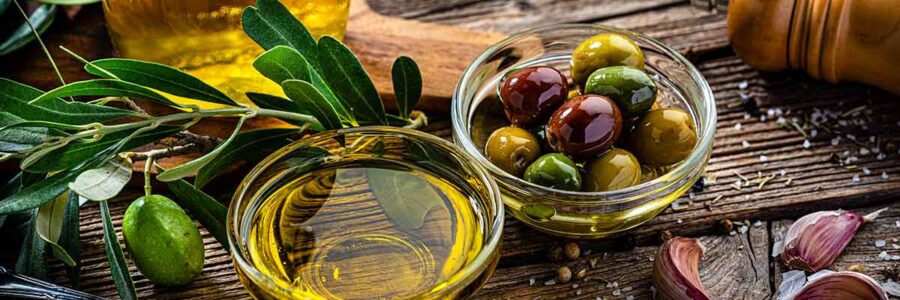The debate around cooking with olive oil, particularly extra virgin olive oil (EVOO), has sparked confusion for years. Some claim that heating it destroys its beneficial compounds, making it unstable and harmful, while others argue that it remains one of the healthiest choices for cooking due to its natural antioxidants and high monounsaturated fat content.
So, what’s the truth? Let’s dive into the science behind olive oil’s stability, smoke point, and nutrient retention to determine whether it’s a safe choice for cooking and maintaining optimal cell health.
The Science Behind Olive Oil’s Stability
A major concern surrounding cooking with EVOO is whether heat degrades its polyphenols and antioxidants, rendering it less beneficial. While some nutrient loss does occur, research shows that EVOO retains up to 80% of its polyphenols even after being heated at moderate temperatures.[1]
A study published in Food Chemistry found that EVOO maintained much of its antioxidant content even after sautéing at 320°F for 20 minutes. This challenges the notion that all beneficial compounds in olive oil break down at high temperatures. Additionally, EVOO’s high monounsaturated fat content (around 73%) and natural antioxidant properties make it highly resistant to oxidation, reducing the risk of free radical formation.[2]
Smoke Points and Oxidative Stability: What Matters Most?
The smoke point of an oil refers to the temperature at which it begins to degrade and release harmful compounds. However, oxidative stability, or an oil’s ability to resist rancidity and degradation, is just as—if not more—important than smoke point.
- Extra Virgin Olive Oil (EVOO): Smoke point of 350°F to 375°F, depending on purity and processing.
- Refined Olive Oil: Can have a higher smoke point of up to 470°F.
Since most home cooking occurs below 375°F, EVOO remains a safe and stable choice for sautéing, roasting, and baking. However, prolonged high-heat exposure, such as deep frying at temperatures above 400°F, may degrade its health benefits.
Olive Oil vs. Seed Oils: Stability is Key for Cellular Health
Many people assume that oils with higher smoke points, such as canola, soybean, and sunflower oils, are better for cooking. However, smoke point is not the best indicator of safety—oxidative stability is a more critical factor.
Industrial seed oils, high in polyunsaturated fatty acids (PUFAs), are highly prone to oxidation. When exposed to heat, they produce toxic aldehydes and inflammatory byproducts linked to metabolic dysfunction, cellular inflammation, and chronic disease.
In contrast, EVOO’s monounsaturated fat structure and high antioxidant content provide protection against oxidative stress, making it a far superior choice for maintaining cellular health and longevity.
Does Cooking with Olive Oil Destroy Its Nutrients?
One of the biggest concerns is whether heat eliminates olive oil’s key nutrients. While cooking does reduce some polyphenol content, studies show that EVOO retains a significant portion of its beneficial compounds even after moderate heat exposure.
To maximize EVOO’s health benefits, it’s best used for low-to-moderate heat cooking and as a finishing oil to drizzle over foods after they’ve been cooked. This method helps preserve its antioxidants while still providing a stable and healthy fat source.
Best Ways to Use Olive Oil for Optimal Health
To protect the integrity of EVOO and get the most nutritional benefits, consider these cooking strategies:
- Sautéing and Roasting: Safe at temperatures below 375°F.
- Quick Frying: Works well for short cooking durations at moderate heat.
- Drizzling After Cooking: Retains maximum polyphenol content for cellular health.
- Proper Storage: Keep in a cool, dark place in a tinted glass bottle to prevent oxidation.
Following these best practices ensures that EVOO remains a stable and beneficial fat for overall wellness.
When to Use More Stable Fats for High-Heat Cooking
For cooking at higher temperatures, saturated fats offer better oxidative stability. These fats retain their structure even under intense heat and do not produce harmful byproducts.
Some of the best high-heat cooking fats include:
- Ghee: Smoke point of 485°F, rich in vitamins A, D, and K2.[4]
- Beef Tallow: A traditional fat with high oxidative resistance.[5]
- Coconut Oil: Contains medium-chain triglycerides (MCTs), making it highly resistant to heat-induced degradation.[3]
Using these traditional fats instead of unstable seed oils can help reduce inflammation, support metabolic function, and protect cellular integrity.
The Verdict: Should You Cook with Olive Oil?
The evidence supports that extra virgin olive oil is a safe and healthy cooking fat when used correctly. While high-heat cooking may degrade some of its nutrients, EVOO remains stable at moderate temperatures, making it an excellent choice for sautéing, roasting, and baking.
To maximize its cellular health benefits, using EVOO raw as a finishing oil is ideal. And for high-heat applications, relying on more stable saturated fats like ghee, butter, and coconut oil is the smarter option.
By choosing the right fats based on stability and nutrient retention, you can support long-term health, reduce oxidative stress, and enhance metabolic function.
So, is it safe to cook with olive oil? Absolutely—when used properly, it remains one of the best options for health-conscious cooking and cellular support.
References:
- Lozano-Castellón, Julián, et al. “Domestic Sautéing with EVOO: Change in the Phenolic Profile.” Antioxidants, vol. 9, no. 1, Jan. 2020, p. 77.
- Ambra, Roberto, et al. “A Review of the Effects of Olive Oil-Cooking on Phenolic Compounds.” Molecules, vol. 27, no. 3, Jan. 2022, p. 661.
- Jadhav, Harsh B., and Uday S. Annapure. “Triglycerides of Medium-Chain Fatty Acids: A Concise Review.” Journal of Food Science and Technology, vol. 60, no. 8, Aug. 2023, pp. 2143–52.
- Kataria, Deepshikha, and Gurmeet Singh. “Health Benefits of Ghee: Review of Ayurveda and Modern Science Perspectives.” Journal of Ayurveda and Integrative Medicine, vol. 15, no. 1, 2024, p. 100819.
- Russell, Margaret F., et al. “Tallow, Rendered Animal Fat, and Its Biocompatibility With Skin: A Scoping Review.” Cureus, vol. 16, no. 5, p. e60981. PubMed Central, https://doi.org/10.7759/cureus.60981.


